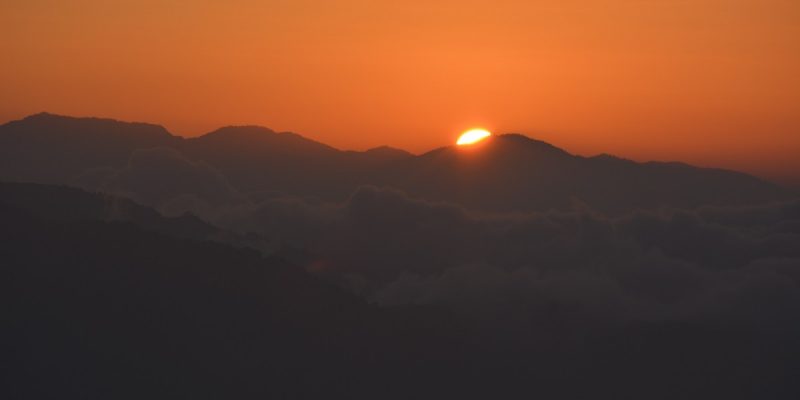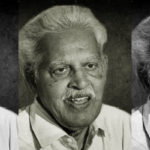The hills are good teachers. They teach you to wait. So do airports. Airports, however, have an arrival and departure regimen – an immediacy that the hills perhaps lack to their advantage. You can prolong your stay as you like.
Last December, I rode up to Mukteshwar in the Kumaon hills hoping to escape the tourists who still prefer Nainital – though that might change soon.
I went for long walks, read books in quaint neighbourhood cafes, saw films in the confines of my hotel room snuggled up in bed enjoying hot chocolate and chili chicken. I realised that hills could also engineer deviations in your food habits. On a whim, I requested the hotel staff for a plate of aloo bhujiya or aloo bhaja as we call in Bangla. Nothing like it existed on the menu, but they obliged by sending a plateful fried in mustard oil.
Gradually, the night would descend and every house on the horizon would seem straight out of writer Nirmal Verma’s prose. The windows, doors, narrow pathways – you know them all relying on the memory of what you have read. Instead of Google, I asked the hotel manager how far Shimla, Verma’s native place, was. I also went up to see Mahadevi Verma’s summer home in Malla Ramgarh near Almora. The house has now turned into a library. Amongst others, I saw Nirmal Verma’s portrait hanging on the wall. He had visited and spoken at the library several times in the past.
Also read: What an 80-Year-Old Short Story Tells Us About Ethics During Quarantine
During my stay on the outskirts of Mukteshwar, I had to walk a long distance to arrive at the village square where local transport to reach the main market could be found after considerable waiting. A rickety jeep would show up and you had to squeeze your way in. My fellow travellers could easily tell that I wasn’t one of them.
An old man sitting next to me asked, “What’s so special about these hills that city folks like you come to visit?”
Not knowing what to say, I smiled. Serene and tranquil are adjectives that now reek of overuse. Besides those may not have meant much to the old man.
§
December, however, seems like a distant memory now. The world is in a daze. We live between lockdowns and suspension of disbelief.
Recently, I sat on a plane to fly to my home state. I suffix the word state with home to suggest that I was born there and also spent my childhood there. Saying just ‘home’ evokes a set of connotations that I want to avoid. This trip was not a vacation. I was armed with a face mask, hand gloves, sanitisers and was extra cautious about my movements at the airport. Before boarding the flight, we were also supplied with a face shield, which made us look like faux warriors. It felt oppressive to fly dressed in that armoury and caged inside an aircraft for the next two and half hours. I was so stiff that I even forgot to look outside the window while sitting next to it. Suspicions further grew when we heard a sneeze. My neighbour and I exchanged glances wondering if this was ominous.
I reached my destination safe. The prospect of home food felt comforting. Upon arrival, I followed rules of home quarantine. My quarantine room has large, airy windows and an adjoining balcony. It brings in lots of sun and rain. A lake stands nearby where migratory birds come visiting in December. We were told that they fly from Siberia every winter. As children, we were taught obedience. We never questioned the veracity of these claims. It was a rather happy occasion when our sub-urban town found a mention in the press thanks to the arrival of the birds. Sometimes a photograph would also appear. We would cut and paste many of those in our little scrap books. My home town after all did not feature in big novels or poems or films. Any mention was thus a reason to rejoice.
Also read: Stuck at Home, Kashmiris Are Using Social Media to Spark Progressive Conversations
Soon bird watching camps would be set up, photographers would walk around with their devices and all kinds of people came to walk, watch, sketch, chat, take a stroll. A friend once introduced me to a writer who mentioned visiting the lake every Sunday during winter. His wife packed him tea and sandwiches. He would turn the visit into a small solitary picnic. Things changed after the advent of the mobile phone camera. Now we try to process the world through the eye of our phone camera. We rely on our devices to capture and record memory. We think through our devices. It all seems a function of click and delete.
My friend from school is also visiting home. We are neighbours. We haven’t seen each other in the last many years. We live and work in different cities. From my quarantine window, I took a photograph of his apartment building and sent him a message saying he is so close yet so far. I never imagined that meeting a friend residing in the next block would be ordained by time.
I have always admired poets who questioned the all-pervasive authority of time. Shakespeare chided time for feeling too mighty. John Donne asked to rage against it. I seemed hopeful reading those lines. But now there’s no escaping time.
Sitting alone and looking out through my quarantine window, I wonder if the birds will visit this December, if the birdwatchers will assemble again, if I will be able to meet my friend soon before another lockdown is announced.
After all, time after has a new accomplice – quarantine.
Kunal Ray teaches literary and cultural studies at FLAME University, Pune.




